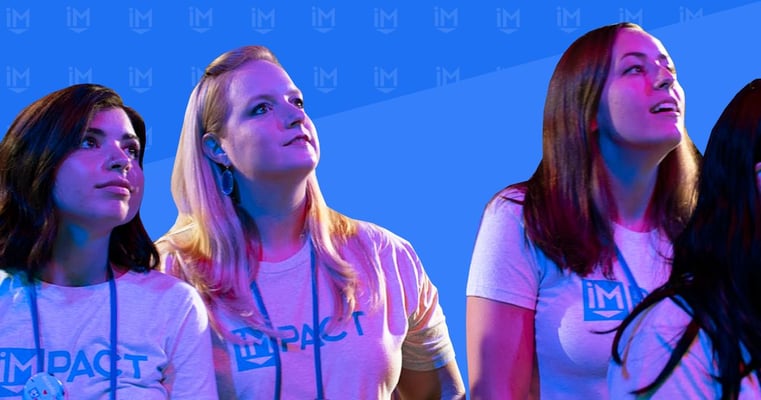Subscribe now and get the latest podcast releases delivered straight to your inbox.
I Didn’t Want To Write About Being a Female C-level Executive, but Here I Am

By Brie Rangel
May 21, 2020

A couple weeks ago, my dear colleague, IMPACT Head of Editorial Ramona Sukhraj, asked me if I was down to write an article this month before I go on parental leave.
Of course, I said, “Sure!”
To my surprise, Ramona said that she had a specific topic she'd like me to address.
You see, usually, I work with IMPACT Editorial Director Liz Moorehead on my content — we talk about what's on my mind, what are the most important topics I want to be addressing, and so on. So, it was unusual for me to be presented with a pre-selected topic.
Still, I was game.
Well, until she told me what the topic was, that is.
Ramona said she’d like me to reflect on my first few months as the only woman in a C-level position at our company.
My initial reaction?
I literally said “Womp womp” to myself out loud, while sitting at my desk.

I’m sure my husband, Daniel, who is working from home now — thanks, COVID-19 — is used to hearing my random one-liners in the other room by now. He didn’t ask, so he must be.
Anyway, when I say “Womp womp,” what I mean is this is an area that I did not want to write about.
Especially for my first article as IMPACT’s COO.
I was looking forward to talking about everything we’re doing in implementing the Rockefeller Habits, designing our client experience, completely revamping our performance review process, and all kinds of other really hard projects with really big payoffs for our organization.
And when those payoffs happen, I want to be able to share them in my writing, along with what I learned along the way to help other organizational leaders venturing in similar endeavors.
Instead, the first article I was asked to write was about being a girl.
That's why, at first, I was annoyed. This kind of topic stuffs me in a box that I don’t want to be in.
I don’t see myself through the constraints of gender roles.
So, writing about doing what I do from the lens of my gender feels completely off.
Despite my initial sense of dread, I still agreed to do it because I trust our content team and their thoughts on what topics resonate, and figured I’d talk with Liz about how to deliver what they were looking for.
Why I don't want to talk about being a woman in a C-level position
When I first moved into the COO position at IMPACT at the end of last year, Liz and I had met about how my content contributions might change. I remember I specifically told her I didn’t want to write about anything to do with gender.
At the time, she let it go.
Sigh. Only to bring it back up now.
Thanks, Liz.
(Editor's Note: You're welcome!)
But then she challenged me:
"Why don't you want to talk about it? I ask because that's actually exactly what I want you to talk about — I know about your resistance to the topic overall, and I want you to be brutally honest about why. Publicly. To our audience."
I needed to take a minute to think about why this topic bothers me so much. What I realized is that I want to write about my work and what I learn.
Those two things have nothing to do with me being a woman.
Or maybe they do a little bit on a subconscious level, but that’s beyond my expertise to dive into and figure out. And it doesn't govern my decision-making.
I never have a day where I wake up and think:
“Today I’m going to do X, Y, and Z because I’m a woman.”
I just do what I need to do based on my own work ethic, merit, and the support of a great team.
Unfortunately, we still need to have this conversation
When I’m asked about how it feels to be a woman in leadership, it reminds me that it’s a sad reality that a woman in the C-suite is still something special or different — so it's a conversation we still have to have today.
Also, I know how it feels to wonder where the women are at when it comes to role models in the industry to look up to.
We have Jim Collins, Patrick Lencioni, Stephen Covey, and countless others covering the leadership bases for men.
But, while they exist, there aren’t very many female leaders who are pioneering the conversation as published authors (or even just visible voices) on the topic of leadership. Except for maybe Sheryl Sandberg.
I also know how it feels when men tell me it shouldn’t matter and that we should all admire the characteristics or contributions of people regardless of their gender. And how it feels easy for them to say that because they have millions of men that shaped their perception of what leadership looks like.
Meanwhile women are still learning their way on how to balance their natural tendencies against the archetype of leadership.
What's my biggest challenge?
That’s probably been my biggest struggle as I’ve “climbed the ranks” — finding how to be me while also being a leader.
I am soft spoken.
I am “nice.”
I am an INTJ, which means I'm supposed to be terrible working with people and should just go work alone as an individual contributor according to all the profile descriptions.
Yet here I am despite all of that, figuring out how to do my job with what I’ve got naturally. And it’s worked to not fit a mold and with strengths rather than against them.
These inherent "challenges" are not gender-specific to me though.
A man could also just as easily be soft spoken, nice, and an INTJ.
So, I’m not an expert in any of this. I just know it makes me bummed that this conversation is still a thing and not a thing of the past.
One caveat that I don’t think is talked about enough or recognized for the intense level of difficulty it adds to doing your job that is different for women — pregnancy. I’ll perhaps save that for another post, but I do want to commend our CEO, Bob Ruffolo, for promoting me when I was three months pregnant.
Regardless of how far we've come, I know that's often not the norm or the experiences that other women have had when pregnant or considering starting a family.
I’ve managed to do what I do while juggling the emotional and physical challenges of being pregnant — during a pandemic, no less — which is no small feat and is unique to my gender.
So, I want to celebrate all the other women surviving and thriving while pregnant and working full-time right now. It ain't easy!
Why gender wasn’t a thing for me at IMPACT
I can’t help the perceived, gender-focused narrative around IMPACT’s decision to move me into the COO position. However, I can tell you how it’s played out so far. Moreover, I can definitively say that my gender hasn’t held me back or affected my work in any way in this role.
In becoming the COO, I joined our senior executive team of four men and now me. I also joined our owner’s meetings, also consisting of six men and now me.
Did I notice that or do anything different because I was the only woman? No.
Did they? Actually, yes.
Brace yourselves for this scandal. They held back on some of their usual fart jokes until I told them I also find fart jokes funny.
But that was it. Really.
More than that, they would have censored themselves for any newcomer to make sure they made that person feel welcome. Why? Because they’re kind and courteous people who genuinely care about people and how their actions might negatively impact others. My gender had nothing to do with them initially toning things down.
Aside from reassurance that I have a sense of humor, I have not had one other moment where I even noticed I’m a girl and they are boys.
Everything I do is based on the responsibilities of my job, my priorities, and how I can best help the company.
All of which, again, have nothing to do with my gender.
If you're in a similar spot, being asked the same questions, here's my advice
Earlier in my career, especially when I was younger and less skilled in communication and leadership in general, I did have questions on if the way I was treated or the lack of outcomes I was able to influence had anything to do with being a woman.
In some cases, I’m sure it did.
In most circumstances, however, I’m now sure it was more about my lack of skills that produced the lack of outcomes I wanted.
This is a very hard line to figure out, though. And, for the same reason this is a topic, there will still be cases when you very well could be discriminated against due to your gender.
The advice I have is to focus on what you can control.
I can’t change that if I were a man, this certainly would not be an article worth writing or reading.
What I can do is focus on my work, on improving my skills to yield the intended results, and be open-minded to all feedback and criticism without immediately leaping to the conclusion that my gender had anything to do with what I'm told.
I can also focus on not conforming to a mold that isn’t me.
I can improve my skills without changing my personality.
If we all do this, maybe someday we’ll tilt that narrative. We’ll have more women mega business authors. We’ll have more role models who showed an alternative path to leadership.
And I won't have people like Liz challenging me to publicly push against this narrative that's often placed upon us.
Surely this day will come.
Until it does, though, just do you.


Order Your Copy of Marcus Sheridan's New Book — Endless Customers!